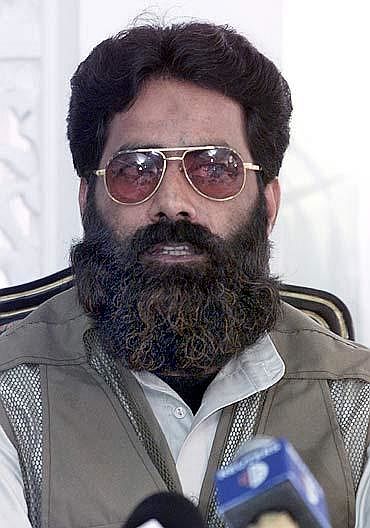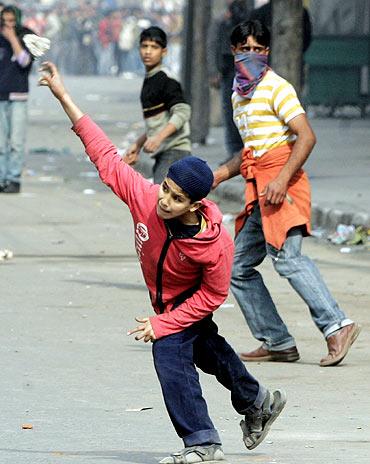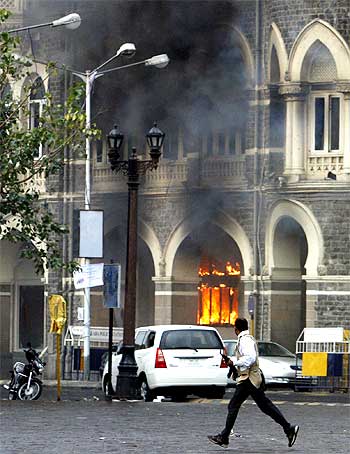Ilyas Kashmiri's death comes as a relief to security agencies across the world, especially India since he was obsessed with undertaking attacks on the Indian soil. His latest operation -- Ghazb-e-Hind aimed at unleashing a wave of destruction in India, reports Vicky Nanjappa.
Who was Ilyas Kashmiri?
Known among terror circles as Maulana Ilyas Kashmiri, the 57-year-old started out as a mujhahideen fighting the Union of Soviet Socialist Republics. He lost one eye fighting the Soviets and was considered one of the fiercest warriors in Afghanistan.
Hailing from the Kotli district of Pakistan occupied Kashmir, he was once a confidante of the ISI. There were also reports suggesting that he was part of the Special Services Group of the Pakistan Army.
...
The Valley was on top of Kashmiri's terror agenda
Image: A Kashmiri protester throws a stone towards a policeman during a protest in SrinagarWhile planning operations in the Valley, Kashmiri was arrested by Indian forces in early 1990s, but managed to escape after two years. On his return to Pakistan, he continued to control operations in Kashmir and insiders say that had the backing of Pervez Musharraf who was then the Pakistan Army chief.
But after differences with the ISI, the HuJI attempted to assassinate Musharraf in 2000. Kashmiri was arrested in connection to the case, but was let off following which he continued to battle American forces in Afghanistan.
In 2009, US forces claimed to have killed Kashmiri in North Wazirstan, but the reports proved false after Kashmiri came out in the open and gave an interview to Shahzad, the Pakistan bureau chief of Asia Times Online.
On August 6, 2010 the US labelled Kashmiri as specially designated global terrorist, while the United Nations added him and HuJI to its blacklist established under UN Security Council Resolution 1267.Kashimir's terror mission against India
Image: Kashmiri is said to have hijacked the Mumbai terror attack plan from the ISI"Kashmiri was in the know about the 26/11attacks, which originally scripted by the Pakistani security agency," the journalist wrote.
Under the direction of General Ashfaq Kayani, the then ISI director general and now the Pakistani Army chief, Kashmiri planned several low-key attacks across India. This continued even after General Nadeem Taj took over as the ISI chief.
In the run up to the Mumbai attacks, a few dozen terrorists were trained at the Mangla dam near Islamabad to be later sent to Gujarat from where they were to travel to Kashmir and give the militancy in that state a terror fillip. Lashkar-e-Tayiba commander and one of the 26/11 masterminds Zaki-ur-Rehman Lakhvi was a part of this plan.
But Al Qaeda operatives stepped in and suggested that instead of carrying out a low-profile attack in Kashmir, a more dreadful attack should be carried out in Mumbai. Lakhvi and his ISI handlers agreed and decided to go ahead with the 26//11 plan.
According to Shahzad's book, Kashmiri believed that India would intervene in Afghanistan and if that happened he planned to launch Ghazb-e-Hind -- a massive terror operation across the country.
IB reports suggest that a large recruitment drive had already commenced and cadres from Kerala had been roped in and were being trained under Kashmiri.
Did ISI want Kashmiri eliminated?
Image: The ISI logoThe recent attack at the Mehran naval base and 26/11 are two incidents the ISI would rather let the world forget. The death of Shahzad and now Kashmiri are clear indications of the fact that the ISI has a lot to conceal, say insiders.
Kashmiri was one of Shahzad's important sources and during their interactions many aspects regarding the involvement of the ISI in various attacks were coming to light. This is clear from the fact that Shahzad was keen to expose the infiltration of Al Qaeda in the Pakistani establishment.
This was something that the ISI could not afford since the ongoing trial at Chicago has put the spy agency in a fix, say sources. While LeT operative David Headley claimed that ISI trained him for the 26/11 attack, co-accused Tawahhur Rana confessed that he was an ISI agent and not a Lashkar man. Moreover, a lawsuit is filed in a US court by the family of 26/11 victims Rabbi Gavriel Noah Holtzberg and his wife Rivka, to declare the ISI as a terrorist group.
Also, the death of Al Qaeda leader Osama bin Laden has also spelt more trouble for the spy agency. Terror outfits feel let down by the ISI, as they are of the opinion that bin Laden could have been protected. Kashmiri, was very local about his discontent with the spy agency and this did not go down well with the Pakistani establishment. Sources in the Indian intelligence suggest that ISI probably felt it was best to get rid of Kashmiri, who was on the US hit list.




article